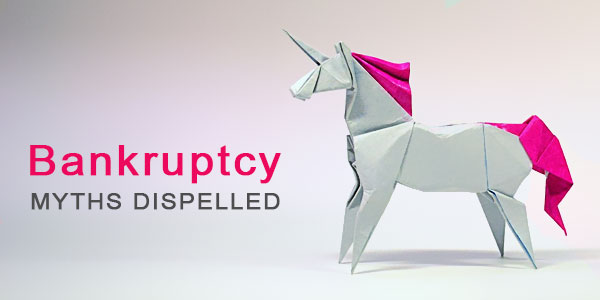Filing Chapter 7 or Chapter 13 bankruptcy may not seem simple or attractive. The entire process of a successful bankruptcy discharge may entangle you into a complex array of paperwork before you could claim to be debt free.
So, here are 5 bankruptcy myths that have been debunked to make understanding of bankruptcy a lot easier.
Myth 1: Debt repayment is better than bankruptcy
Myth-busting facts:
Filing bankruptcy doesn’t always mean that you’ve played truant with your creditors’ money. Rather, it could be the next best thing in your life that grants you with a fresh opportunity to start life afresh.
Make sure that you understand that bankruptcy isn’t one-size-fits-all solution to every debt problem you can think of. It’s best to work with an attorney if you’re planning to file bankruptcy.
For instance, if your total outstanding debts are more than half of your annual pay, and there’s no way you could pay those debts off in the next 5 years, then bankruptcy could be your calling.
Check-out: FTC Facts and Basics of Bankruptcy
Myth 2: Bankruptcy doesn’t provide relief from back taxes
Myth-busting facts:
Though it’s true, yet you can bet on tax bankruptcy to protect you from the ire of the Internal Revenue Service (IRS).
Myth 3:Married couples will have to file bankruptcy jointly
Myth-busting facts:
This ain’t true. If married people owe the debt in their name, their spouses aren’t liable for the same. But, it’s necessary to file bankruptcy in case of jointly-owed debts. Or else, creditors will come after the spouse for loan repayments who hasn’t filed bankruptcy.
Myth 4: Bankruptcy filing reveals personal shortcomings
Myth-busting facts:
Bankruptcy is still considered a taboo amongst the masses that shows the debtor as a failure with a distinct flaw in his or her character.
Around 57% bankruptcies filed in 2009 were due to sky-rocketing medical bills. In over a decade, medical expenses have grown 7 times faster than wages. As a result, a lot of bankruptcies are filed because of low wages instead of lack of proper financial management.
Myth 5: Bankruptcy robs financial freedom
Myth-busting facts:
Post a bankruptcy discharge, you may have limited access to a fresh line of credit or pay higher than usual interest on loans for 7 to 10 years until it’s dropped off your credit report.
Moreover, you can follow some credit repair steps after bankruptcy to rebuild your credit score.
For instance, you can use secured credit cards to establish a good credit history. It’d be tough during the initial stages, but if you choose the right financial tools, then that will take you places and save your financial life from further disasters.
Read: Bankruptcy: The final hope for the debt-distressed
Myth 6: Bankruptcy cancels all the debts
Myth-busting facts:
Most of your debts could be forgiven under Chapter 7 and Chapter 13 bankruptcy, but not all. There are certain exceptions where bankruptcy won’t cancel debts that you’re personally liable for.
Your bankruptcy attorney will help you understand which debts will be affected. However, you can have your personal loans, credit card debt, medical bills, and others discharged under bankruptcy. Talk to your attorney regarding what debt is dischargeable and what isn’t under bankruptcy.
Myth 7: I can use my credit cards to the fullest, get into bad debt, and file bankruptcy to avoid paying a dime
Myth-busting facts:
This kind of act is referred to as fraud. Bankruptcy judges scorn at people who commit such crimes and punish such people severely who try to outsmart the legal system of the country.
Myth 8: You lose all in bankruptcy
Myth-busting facts:
In reality, you’re likely to keep a lot of your possessions.
You can keep a lot of your assets after a bankruptcy discharge.
Most of the Chapter 7 bankruptcy cases are no-asset cases. As a debtor, you can protect some of your basic assets citing exemptions that are crucial for daily living.
If you own a Rolls Royce, then that will be auctioned to pay off your creditors.
Under Chapter 13 bankruptcy, you can retain all of your assets, but their value will be counted in your court-approved debt repayment plan.
Myth 9: Filing bankruptcy is an uphill task
Myth-busting facts:
It isn’t. To successfully get a bankruptcy discharge, you may not even require an attorney as you can do the documentation by yourself. Still, having represented by an attorney is a better option than without one.









